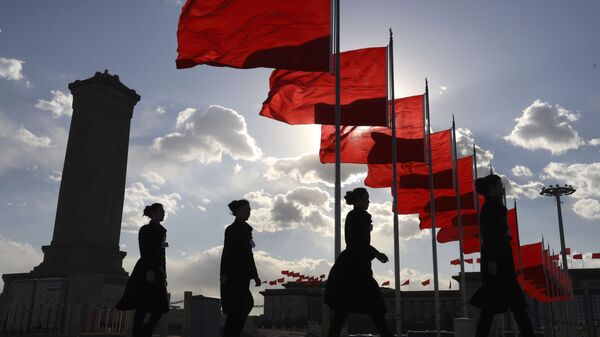The US is spearheading the initiative to hold an "independent" international inquiry into the coronavirus' origins and China's alleged culpability for the COVID-19 spread. On Sunday, Secretary of State Mike Pompeo claimed that there is "enormous" evidence that the virus came from a virology laboratory in Wuhan but failed to present any proof to back the assumption.
China resolutely denied the claims that the coronavirus was either artificially cultivated or escaped from the Wuhan lab citing the scientific consensus that SARS-CoV-2 arose naturally. Likewise, the People's Republic rejected the idea of an international inquiry into the origins of the disease explaining that, first, the probe appears to be "a politically motivated initiative"; and, second, that it is not the right time to launch an investigation in the midst of the anti-pandemic struggle.
New Cold War-Style Smear Campaign
What is going on is a new cold war-style smear campaign against China and its leadership driven by the US, which is trying to deflect the blame for its failure to curb the virus onto Beijing, says Dr. Heinz Dieterich, director of the Centre for Transition Sciences (CTS) at the Autonomous Metropolitan University in Mexico City, and coordinator at the World Advanced Research Project (WARP).
According to the professor, the People's Republic has a good reason for being suspicious of the US-championed "independent" inquiry given the long record of the West's intimidation efforts directed against China. To illustrate his point Heinz outlined five "strategic battles" waged by the US and its allies to exert pressure on the People's Republic and undermine its rise.
First, in the 1950s, the US overtly threatened China with the use of nuclear weapons over the Korean crisis and even considered bombing "North Korea and Communist China, if necessary, to end the Korean War", according to documents cited by The New York Times in 1984. In addition, Washington issued a nuclear threat against the People's Republic in 1955 during the First Taiwan Strait Crisis in order to support the US-backed government in Taiwan.
Second, after the failure of its nuclear blackmail policy, the US' thought leaders, including the grandmaster of free-market theory Milton Friedman, worked out a new "market-based approach" towards China, the professor continues. They suggested that a market-based economic development coupled with increased integration with the outside world and the emergence of the Chinese new middle class would, in the long run, "liberalise" the People's Republic and bring an end to the "Communist era".
"The technical argument of the neoclassic school (neoliberalism) that the computational capacity of state institutions will never be sufficient to coordinate a modern market economy is now basically refuted by the development of the internet and computing capacity", Heinz elaborates, referring to the fact that the Chinese political leadership has efficiently adapted the country to the changing global market environment.
Third, the Trump administration kicked off a trade war against China targeting, in particular, Beijing's strategic plan "Made in China 2025", a 10-year guideline of how to transform the country from the "world's factory" to an independent hi-tech powerhouse.
Washington sought "to maintain the oligopolistic control of US corporations over the decisive global high-tech industries, by destroying the Communist Party of China's 2025 initiative", Heinz suggests, adding that the US did not have the strength to win that "war" given that Chinese technological giants managed to rally substantial support across the world.
Fourth, as the US turned into the global epicenter of the COVID-19 pandemic Trump unleashed a "psychological warfare blame game" upon Beijing seeking "to forge a global anti-China coalition that will judicially solicit trillions of dollars in damage for the supposed Chinese 'cover up' and 'negligence' vis-a-vis the original outbreak", the professor says.
Following Missouri and Mississippi's suit the US law firm “Berman Law Group” has brought a class action law suit against China in Florida and Texas, striving to get more than $6 trillion in compensation. However, according to law experts cited by Newsweek, the chances that these lawsuits would bring any tangible results are very slim.
Finally, the decisive soft power battle for hearts and minds is now unfolding, according to the academic: the US and its allies are struggling to downplay China's success in curbing the COVID-19 pandemic and demonise Beijing's global health effort as inconsistent and politicised.
However, as Zhang Ming, the Chinese envoy to the European Union underscored on 24 April, the People's Republic will continue to help others fight the coronavirus and save as many lives as possible, no matter what kind of labels are given to the country's aid programme.
According to Heinz, China has a good chance of winning this battle by maintaining its strategic alliance with Russia, sticking to its "Global Health Silk Road" initiative and following its established political course.




